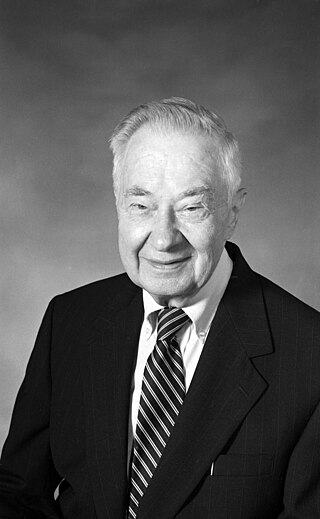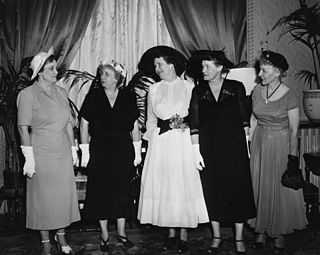
Iredell County is a county located in the U.S. state of North Carolina. As of the 2020 census, the population was 186,693. Its county seat is Statesville, and its largest community is Mooresville. The county was formed in 1788, subtracted from Rowan County. It is named for James Iredell, one of the first justices of the Supreme Court. Iredell County is included in the Charlotte-Concord-Gastonia, NC-SC Metropolitan Statistical Area, as defined by the Office of Management and Budget, with data from the U.S. Census Bureau.

Statesville is a city in and the county seat of Iredell County, North Carolina, United States, and it is part of the Charlotte metropolitan area. Statesville was established in 1789 by an act of the North Carolina Legislature. The population was 28,419 at the time of the 2020 census.

William Stevens Powell was an American historian, writer, academic, and teacher. He authored over 600 articles and books about the history of North Carolina and was the editor of the six volume Dictionary of North Carolina Biography. He was professor emeritus of history at the University of North Carolina at Chapel Hill, having retired in 1986.
Harold Johnson is an American sportscaster. He was sports director for WSOC-TV in Charlotte, North Carolina for 26 years, during which time he won four Emmy Awards and was nominated for two others. He was the 2010 Republican nominee for North Carolina's 8th congressional district.

The Charlotte metropolitan area, sometimes referred to as Metrolina, is a metropolitan area of the U.S. states of North and South Carolina, containing the city of Charlotte. The metropolitan area also includes the cities of Gastonia, Concord, Huntersville, and Rock Hill as well as the large suburban area in the counties surrounding Mecklenburg County, which is at the center of the metro area. Located in the Piedmont, it is the largest metropolitan area in the Carolinas, and the fourth largest in the Southeastern United States. The Charlotte metropolitan area is one of the fastest growing metropolitan areas in the United States.
Mississippi Freelance was a liberal monthly newspaper, with the stated mission of "reporting the otherwise unreported." The paper was edited by Lew Powell and Ed Williams, who were working at the time as reporters for the Greenville, Mississippi Delta Democrat Times and articles were written by volunteer reporters.
The 1995 NC State Wolfpack football team represented North Carolina State University during the 1995 NCAA Division I-A football season. The team's head coach was Mike O'Cain. NC State has been a member of the Atlantic Coast Conference (ACC) since the league's inception in 1953. The Wolfpack played its home games in 1995 at Carter–Finley Stadium in Raleigh, North Carolina, which has been NC State football's home stadium since 1966.

Reed Sarratt (1917-1986) was an American journalist and editor from North Carolina. He wrote about school desegregation in the Southern United States. He served as the executive director of the Southern Education Reporting Service from 1960 to 1965, and the Southern Newspaper Publishers Association from 1973 to 1986.

Gladys Love Avery Tillett was an American political organizer and activist, based in North Carolina. She supported women's suffrage when she was a college student, and was working for passage of the Equal Rights Amendment in her eighties.
The 1990 North Carolina Tar Heels football team represented the University of North Carolina at Chapel Hill during the 1990 NCAA Division I-A football season. The Tar Heels played their home games at Kenan Memorial Stadium in Chapel Hill, North Carolina and competed in the Atlantic Coast Conference. The team was led by head coach Mack Brown.
The 1984 North Carolina Tar Heels football team represented the University of North Carolina at Chapel Hill during the 1984 NCAA Division I-A football season. The Tar Heels were led by seventh-year head coach Dick Crum and played their home games at Kenan Memorial Stadium in Chapel Hill, North Carolina. They competed as members of the Atlantic Coast Conference, finishing in third.
The 1986 NC State Wolfpack football team represented North Carolina State University during the 1986 NCAA Division I-A football season. The team's head coach was Dick Sheridan. NC State has been a member of the Atlantic Coast Conference (ACC) since the league's inception in 1953. The Wolfpack played its home games in 1986 at Carter–Finley Stadium in Raleigh, North Carolina, which has been NC State football's home stadium since 1966.
Homer Maxwell Keever was a local historian, journalist, Methodist deacon, high school teacher, and author of hundreds of local histories published in Statesville, North Carolina about the history and folklore of Iredell County, North Carolina, including the book, Iredell, Piedmont County, published for the United States Bicentennial.

Rev. James Hall, D.D. was a Presbyterian minister, chaplain in the Rowan County Regiment during the American Revolution, educator, and missionary in the Natchez area of the Mississippi Territory. He helped to found the Fourth Creek Congregation as its second minister. He was the first minister of Concord Presbyterian Church and Bethany Presbyterian Church in Iredell County, North Carolina on April 8, 1778.
Catherine Keever was an educator and ecologist focused on ecological succession and highland region ecology. Keever proved that moss is the first plant to grow on bald rock, rather than lichens.

Wearn Field was a ballpark located in Charlotte, North Carolina and home to amateur and professional baseball in Charlotte from 1912 to 1940. Wearn Field was built and owned by Hornets club owner J. H. Wearn alongside his lumber mill. Home plate was at the corner of South Graham and Winona Streets; the right field corner was at South Graham and Commerce.

Bass Lake, also known as Cone Lake, is a 22-acre (8.9 ha) man-made lake or reservoir located in Blowing Rock, Watauga County, North Carolina, United States. The Moses H. Cone estate, also called Flat Top Manor, is on a hillside overlooking the lake, whose elevation is 3,563 feet (1,086 m). Cone constructed two lakes on the property: Trout Lake and Cone Lake. The lakes are within Moses H. Cone Memorial Park which is listed in the National Register of Historic Places.

The Latta Park Baseball Field was a ballpark located in Latta Park in Charlotte, North Carolina. Its capacity was approximately 1,000 for baseball.